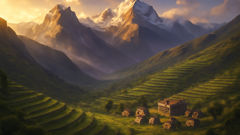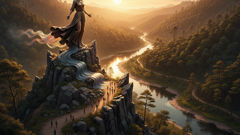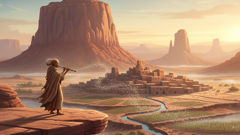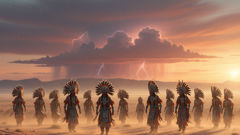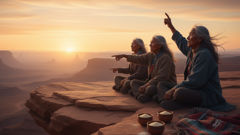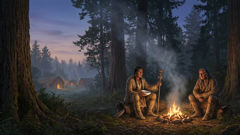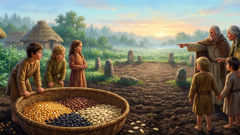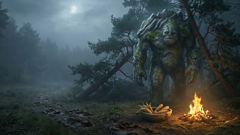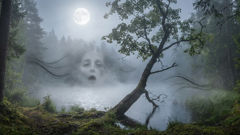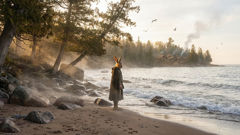Introduction
Where the clouds drift low and the air thins, the Andes stretch like the spines of ancient gods, their snow-capped peaks shimmering above emerald valleys. In Peru, these mountains are more than stone and ice—they are sacred, living guardians known as the Apu. From time immemorial, people of the highlands have looked to these towering presences for protection, wisdom, and guidance, weaving them into every thread of daily life. The Apu are believed to breathe with the wind and speak through thunder; their moods determine the fate of crops, herds, and even hearts. Offerings are made at dawn with coca leaves and chicha, gratitude whispered into the mountain breeze. The bond between the people and their Apus is as old as the earth, rooted in reverence, fear, and hope. In this tale, we travel back to the time when the Inca civilization flourished beneath the watchful gaze of the mountains. Here, in a village cradled by the valley’s arms and towered over by the mighty Apu Salkantay, a young herder named Kusi begins an unforgettable journey. When misfortune strikes his home, Kusi must brave steep passes and ancient rituals, seeking the counsel of the Apus themselves. His path will cross shimmering glacial lakes, whispering forests, and forbidden summits where only the boldest dare tread. Through Kusi’s eyes, the story unveils not just the power of the mountains, but the living soul of Andean culture—a place where the sacred and everyday are one, and every stone holds the echo of legend.
The Village Beneath the Shadow
Nestled high in the Cordillera Vilcabamba, the village of Chawpi lay wrapped in a patchwork of stone terraces and potato fields. Life here was marked by rhythm: the bleating of llamas at dawn, the distant rumble of glacial rivers, the sharp scent of wood smoke rising from thatched roofs. Villagers moved in quiet reverence for the land and sky, each gesture a tribute to ancestors and spirits alike. At the heart of Chawpi stood a plaza ringed by weathered walls, its center dominated by a sacred huaca—a carved stone altar where the people made offerings to the Apus. Children learned from birth to respect the mountains. They left tiny dolls made from straw for the Apu of Salkantay and sang songs to the lesser spirits who dwelled in the streams. Kusi, at fifteen, knew all the stories by heart. His grandmother’s voice—raspy yet warm—would paint pictures of spirits wrapped in mist, of mountains that walked when no one watched. For Kusi, the Apus were real, their breath in every wind and their gaze following him as he guided llamas up the slopes.
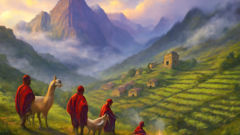
But one season, the clouds gathered and refused to part. For weeks, a cold drizzle settled over Chawpi, and the sun’s warmth was only a memory. The villagers grew anxious as potato leaves turned yellow, water pooled in the terraces, and the llamas huddled in search of shelter. The elders whispered that the Apu Salkantay was displeased.
Kusi’s family was among the hardest hit. His mother’s gentle hands grew rough as she dug trenches to drain the fields, while his father paced between house and corral, muttering prayers beneath his breath. Kusi, too, felt the weight of worry settle on his shoulders like a wet poncho. Each night, he slipped outside, kneeling before the huaca to offer a handful of coca leaves and a silent plea.
It was during one of these nights that he heard the voice—a low, echoing rumble that seemed to vibrate from the earth itself. "Child of Chawpi," it called, "your people’s troubles have reached the heights. The Apu listens, but the offering must be made with courage."
Startled, Kusi looked around. The plaza was empty except for the wind and a stray dog sleeping by the wall. The voice came again, softer now: "Climb to the Lake of Mirrors, bring the heart of the valley, and the mountain will answer."
The Lake of Mirrors—Qoriqocha—was forbidden except during the great festivals, watched by spirits jealous of their peace. To journey there alone was unthinkable for someone so young. Yet Kusi knew he had been chosen. He rose quietly, heart pounding. The next morning, he told his grandmother of the voice. Her eyes searched his, seeing not just a boy but a vessel of hope. She pressed a woven pouch into his hands—a bundle of coca, maize, and a sliver of obsidian. "Go," she whispered. "Go with respect. Go with courage. The Apu watches all."
Before dawn, Kusi set out. He climbed terraces slick with rain, passed fields where llamas blinked at him with dark, solemn eyes. The path grew narrow, lined with ichu grass that sliced at his ankles. Far below, the river roared like a warning. As he climbed, the world opened: green valleys below, cloud forests dripping with orchids above, and always, looming ahead, the ice-draped bulk of Salkantay, face hidden in storm.
The Pilgrimage to Qoriqocha
Kusi’s journey was both a physical trial and a test of spirit. The path to Qoriqocha wound through landscapes alive with legend. As he walked, every stone and shadow seemed to whisper, every breeze a messenger from the unseen.

The ascent grew steeper. Moss-covered stones threatened to slip beneath his sandals. He passed through a grove of polylepis trees, their twisted red bark glistening with dew. Bright hummingbirds darted like living jewels among purple lupine. Kusi paused at a rushing creek, remembering his grandmother’s words: every water is sacred. He knelt and dipped his fingers in, murmuring thanks to Yakumama, the water spirit.
Midday found him at a clearing overlooking the valley. The clouds parted for a moment, revealing distant Chawpi—just a scatter of dots far below. Hunger gnawed at his stomach, but Kusi resisted the urge to eat. Instead, he offered a portion of maize to the earth, as tradition demanded. Shadows shifted around him. He felt eyes—ancient, patient—watching.
As he climbed higher, the air thinned. Each breath was an effort; each step a victory over doubt. The world above the tree line was raw, stripped to rock and wind and sky. Here, the silence pressed in, broken only by the shrill cry of a condor circling overhead. Kusi spotted a cairn of stones—a apacheta—left by other travelers to honor the Apu. He added his own stone, whispering his plea: “Let the mountains remember me.”
Night fell swiftly in the high Andes. The stars emerged, burning fierce and cold. Kusi wrapped himself in his poncho, shivering beside a small fire. He watched the Milky Way—Mayu, the river of the heavens—stretch across the sky. In its shimmering path, he saw the forms his grandmother described: llamas, foxes, the great serpent Amaru. As he drifted to sleep, he dreamed of voices singing in Quechua, a chorus blending with wind and water.
At dawn, Kusi reached the rim of Qoriqocha. The lake was perfectly still, its surface a flawless mirror for the sky. Wisps of mist danced above the water, shifting shapes—sometimes a face, sometimes a hand. He knelt on the shore, unpacking his bundle. With trembling hands, he laid coca leaves in a circle, sprinkled maize, and placed the sliver of obsidian at the center.
He spoke as he had been taught: “Apu Salkantay, father of mountains, see my heart. I bring the hope of my people. If I am worthy, let the waters speak.”
For a long moment, nothing moved. Then the mist thickened, swirling into a column that towered above Kusi. The voice from the plaza returned, now mighty and resonant, echoing off every stone: “You have come with respect and courage, child. What do you seek?”
Kusi found his voice. “My village is suffering. The rains do not stop. The crops drown. The llamas grow weak. I ask for mercy. Teach me what must be done.”
The lake shimmered; images flickered on its surface—fields turning gold, herds fat and healthy, children laughing in sunlight. But the images turned dark: greedy hands taking more than needed, offerings neglected, old songs forgotten. The Apu’s voice grew stern. “Balance has been lost. The earth gives and must be thanked. Your people have forgotten the sacred dances, the stories that keep us strong.”
Kusi bowed his head, ashamed. “How can we remember? What must we do?”
The mist parted, revealing a path that led higher still, toward the glacier’s heart. “Climb to my altar at dawn,” said the Apu. “Bring your people’s songs and make the old offering. Only then will balance return.”
With that, the mist sank into the lake. The wind rose, carrying the scent of wet earth and wildflowers. Kusi knew what he must do.
The Summit of Spirits
Descending from Qoriqocha, Kusi’s mind raced. He carried not just his own hopes but those of his entire village. The Apu had set a difficult task: gather the people, ascend to Salkantay’s hidden altar, and revive the old songs and offerings at dawn. It was a challenge that would demand courage from everyone.
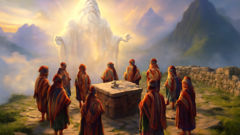
As he returned to Chawpi, word spread quickly. Elders argued—some feared angering the spirits further, others doubted Kusi’s vision. But his grandmother stood by him, her voice calm and unwavering: “The Apu has always watched over us. Now we must watch over our own traditions.” The villagers gathered in the plaza. Kusi spoke, his words fueled by faith: “The Apu calls us to remember who we are—to thank the earth, to honor the mountains. If we go together, we go with strength.”
A reluctant consensus formed. The old drum was brought out, its hide stretched and faded by time. Women wove garlands of yellow and red flowers. Men selected the best maize and potatoes for the offering. Children rehearsed songs, their voices high and sweet. Before dawn, a procession set out—elders at the front, children at the rear, every soul cloaked in wool and hope.
The climb was arduous. Above the tree line, breath came in ragged gasps. Clouds thickened around them, painting the world in ghostly gray. Kusi led the way, clutching his pouch of offerings. The villagers moved silently, each step a prayer.
At last, they reached the altar—a flat outcrop overlooking sheer cliffs and frozen rivers below. Here, stones had been stacked by hands long gone, their surfaces etched with spirals and animal shapes. The air crackled with energy; even the youngest felt it, shivering not from cold but awe.
The people formed a circle. The elders scattered maize and coca leaves; women poured chicha onto the rocks. Kusi stepped forward, voice trembling but clear, and sang the first verse of the oldest song he knew. Others joined in, their voices weaving together—an unbroken chain reaching back through centuries.
As they sang, a change swept over the mountain. The clouds parted just enough to let golden light spill across the altar. A warm breeze stirred, carrying the scent of herbs and wildflowers. Snowmelt trickled down, forming tiny streams that sparkled in the sun.
Then came a moment that would be retold for generations: a figure emerged from the mist, tall as a tree and clad in shimmering robes of silver and blue. His face was carved from stone and shadow, eyes alight with ancient wisdom. The Apu Salkantay had come.
The villagers knelt in silence as the Apu spoke, his voice both thunder and whisper: “You have remembered. You have given thanks. Let this bond remain strong, for the mountain is your guardian as you are its children.”
He raised his hand; snowflakes danced in the sunlight. The crops would grow again, the rivers run clear. “Go with humility and respect,” said the Apu. “Forget not your songs nor your gratitude.”
With that, the vision faded. The mountain stood silent once more, but something had shifted—within the land, and within each heart.
Conclusion
The return to Chawpi was marked by celebration and relief. The rains eased, fields dried, and green shoots pierced the earth once more. In every home, stories were retold—how Kusi’s courage had awakened ancient memories, how the Apu had forgiven and guided them. Children learned new songs for old rituals; elders wove fresh tales into the village’s living memory. As seasons turned and generations passed, Chawpi thrived beneath Salkantay’s shadow. Yet the lesson lingered: to live in the mountains was to live in gratitude, to offer thanks not just in hardship but always. The bond between earth and people endured, woven through song, story, and shared respect. And whenever clouds gathered low or thunder rumbled across the peaks, Kusi’s tale reminded all who listened—the Apu are watching, and their wisdom endures for those who remember.

